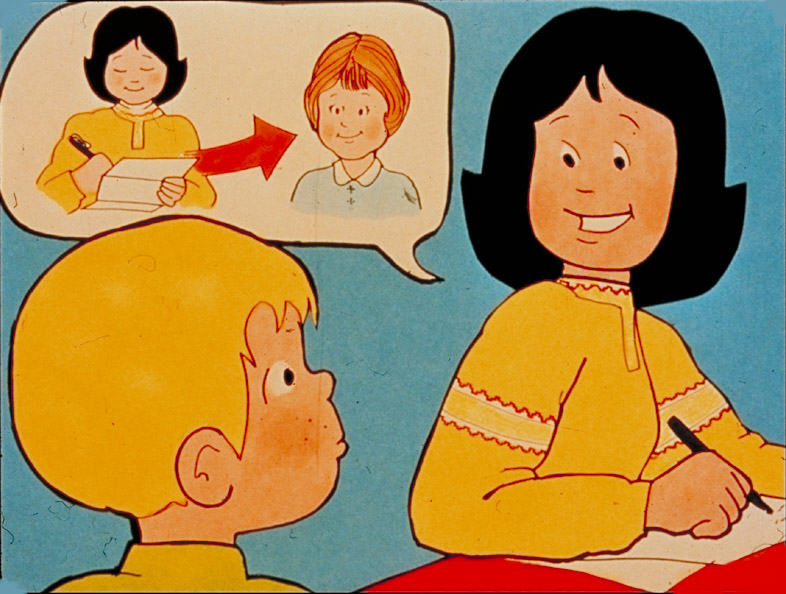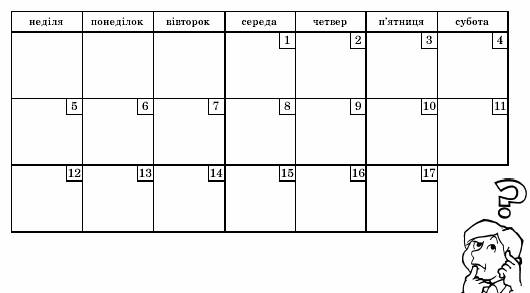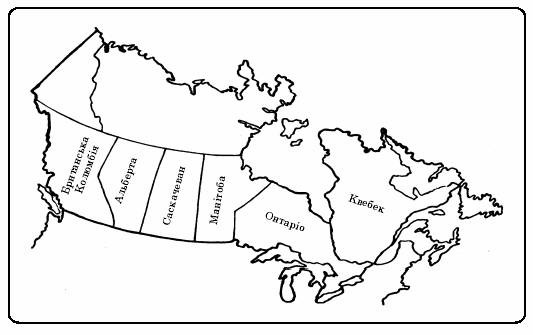
In Lesson 2 you will focus your attention on three cases, the Genitive, Locative and Accusative, in the following contexts:
- Genitive Case – used with the preposition до (to).
- Locative Case – used with the preposition у (в) when indicating a static location.
- Accusative case - used with the preposition у (в) and the days of the week and also used as the direct object of a verb.
Справді? - Really ? Truly ?
так часто - so often, so frequently
|
Іменники: Відмінки
Nouns: Cases |
Родовий Відмінок
Genitive Case
Unit VI introduces you to the Genitive case. This case is interesting and at times complex because it has multiple uses in Ukrainian sentences.
The preposition до (to) is used with the Genitive case. Masculine and feminine nouns must change their form when used in the Genitive case, as described below.
Жіночий рід - Feminine gender
The feminine hard noun ending a changes to и in the Genitive case.
Лариса --- до Лариси
| Я пишу листа до Лариси. |
 |
|
Feminine nouns ending in the soft/iotized vowel я will change to i.
Соня --- до Соні
Я пишу листа до Соні.
The questioning phrase До кого...? (To whom…?) is used to create the question for the sentences given above.
VI. Exercise 2.i
Read each sentence aloud. Underline the noun which appears in the Genitive case and write the Nominative case of the noun in the space given on the right.
Create a question for the sentence, using the phrase До кого...?
• |
Тереса пише до жінки.
|
жінка
До кого Тереса пише? |
|
|
|
1. |
Оленка пише до Лариси.
|
_____________
_________________________________ |
|
|
|
2. |
Лариса пише до мами. |
_____________
_________________________________
|
|
|
|
3. |
Мама пише до Оленки.
|
_____________
_________________________________
|
|
|
|
4. |
Христина пише до Марусі. |
_____________
_________________________________
|
|
|
|
5. |
Маруся пише до Наталки. |
_____________
_________________________________
|
|
|
|
6. |
Калина пише до Христини. |
_____________
_________________________________
|
|
|
|
7. |
Орися пише до Дарусі. |
_____________
_________________________________
|
|
|
|
8. |
Даруся пише до Одарки.
|
_____________
_________________________________
|
|
|
|
9. |
Юстина пише до Орисі. |
_____________
_________________________________
|
|
|
|
10. |
Галина пише до Оксани. |
_____________
_________________________________
|
|
|
|
Чоловічий рід – Masculine gender
Masculine nouns which are animate (living) and end in a hard consonant will have the letter a added to their ending.
дід --- до діда
Петрик пише до діда.
Masculine nouns which end in the vowel o will change to a.
Дмитро --- до Дмитра
Masculine nouns ending in the soft sign ь will change to я.
учитель --- до вчителя
VI. Exercise 2.ii
Read each sentence aloud. Underline the noun which appears in the Genitive case and write the Nominative case of the noun in the space given on the right.
Create a question for the sentence, using the phrase До кого...?
• |
Олена пише листа до Данила.
|
Данило
До кого Оленка пише листа?
|
|
|
|
1. |
Я пишу листа до тата.
|
_____________
_________________________________
|
|
|
|
2. |
Він пише до Богдана . |
_____________
_________________________________
|
|
|
|
3. |
Мама й баба пишуть до діда.
|
_____________
_________________________________
|
|
|
|
4. |
Ми пишемо до Тараса. |
_____________
_________________________________
|
|
|
|
5. |
Вона пише до Степана. |
_____________
_________________________________
|
|
|
|
6. |
Ви пишете до Мирона. |
_____________
_________________________________
|
|
|
|
7. |
Ти пишеш до Бориса. |
_____________
_________________________________
|
|
|
|
8. |
Вони пишуть до Івана.
|
_____________
_________________________________
|
|
|
|
9. |
Дівчата пишуть до Петрика. |
_____________
_________________________________
|
|
|
|
10. |
Мирон пише до вчителя. |
_____________
_________________________________
|
|
|
|
VI. Exercise 2.iii
Complete the exercise by using the Genitive case of the names provided.
|
|
Дівчата |
|
Хлопці |
|
|
|
1. Оксана |
|
6. Дмитро |
|
|
|
2. Калина |
|
7. Борис |
|
|
|
3. Орися |
|
8. Іван |
|
|
|
4. Одарка |
|
9. Богдан |
|
|
|
5. Маруся |
|
10. Петрик |
|
|
|
|
1. |
Петро пише листа до (9) |
_________________________________ |
|
|
|
2. |
Ми пишемо листа до (1) |
_________________________________ |
|
|
|
3. |
Хто пише до (6) |
_________________________________ |
|
|
|
4. |
Тато пише до (3) |
_________________________________ |
|
|
|
5. |
Ви пишете до (4) |
_________________________________ |
|
|
|
6. |
Пані Мороз пише до (10) |
_________________________________ |
|
|
|
7. |
Я пишу до (2) |
_________________________________ |
|
|
|
8. |
Дівчата пишуть до (7) |
_________________________________ |
|
|
|
9. |
Ти пишеш до (5) |
_________________________________ |
|
|
|
10. |
Розалія пише до (8) |
_________________________________ |
|
|
|
|
|
Петруся |
Степан |
Оленка |
тато |
|
|
|
|
мама |
Іван |
дівчина |
Борис |
|
|
|
|
Маруся |
Петро |
Наталка |
|
|
|
|
|
|
• |
До кого ти пишеш, Віро? Я пишу до Оленки. |
|
|
|
1. |
До кого хлопець пише? ________________________________________ |
|
|
|
|
2. |
До кого ви пишете? ___________________________________________ |
|
|
|
|
3. |
До кого Орест пише? __________________________________________ |
|
|
|
|
4. |
До кого Калина пише? _________________________________________ |
|
|
|
|
5. |
До кого пишуть Іван і Степан? __________________________________ |
|
|
|
|
6. |
До кого я пишу? ______________________________________________ |
|
|
|
|
7. |
До кого ви пишете, пані Козак? __________________________________ |
|
|
|
|
8. |
До кого Оксана пише? _________________________________________ |
|
|
|
|
9. |
До кого ми пишемо? __________________________________________ |
|
|
|
|
Знахідний Відмінок
Accusative Case
In previous units you were introduced to the Accusative case. This case is used:
- as the direct object of a verb
- with certain prepositions, such as про.
In Unit VI we will focus on the Accusative case as used with the days of the week and the preposition у (в) (in). The days of the week in Ukrainian are listed below. They are NOT capitalized, unless they happen to appear as the first word in a sentence or title.

Дні тижня
Days of the Week
неділя - Sunday
понеділок - Monday
вівторок - Tuesday
середа - Wednesday
четвер - Thursday
п’ятниця - Friday
субота - Saturday
The names of the days of the week appear in the Nominative case.
If an event or activity is currently taking place or has already taken place on a particular day, the preposition у (в) is used before the name of that day and the day then takes the Accusative case.
You will note that English speakers are accustomed to saying that something is taking place “on Monday” or “on Friday”. In Ukrainian, an activity takes place “in Monday” or “in Friday”. You must think of something being planned “within the day”, rather than “on the day”.
The masculine nouns понеділок, вівторок, четвер do not change endings. Remember that masculine inanimate nouns do not change form in the Accusative case.
понеділок --- у понеділок
вівторок --- у вівторок
четвер --- у четвер
The feminine nouns середа, п’ятниця, субота, неділя change their ending as follows: a changes to у and я changes to ю.
середа --- у середу
п’ятниця --- у п’ятницю
субота --- у суботу
неділя --- у неділю
VI. Exercise 2.iv
Complete the exercise by inserting the days of the week. Use the calendar as your guide.

|
1 |
____________________ |
|
14 |
вівторок |
|
2 |
четвер |
|
15 |
____________________ |
|
3 |
____________________ |
|
16 |
____________________ |
|
|
|
|
|
|
|
6 |
понеділок |
|
7 |
____________________ |
|
7 |
____________________ |
|
8 |
середа |
|
8 |
____________________ |
|
9 |
____________________ |
|
|
|
|
|
|
|
4 |
____________________ |
|
17 |
п'ятниця |
|
5 |
____________________ |
|
18 |
____________________ |
|
6 |
понеділок |
|
19 |
____________________ |
|
|
|
|
|
|
|
9 |
четвер |
|
13 |
____________________ |
|
10 |
____________________ |
|
14 |
вівторок |
|
11 |
____________________ |
|
15 |
____________________ |
|
|
|
|
|
|
VI. Exercise 2.v
Read the sentences out loud. Underline the noun which appears in the Accusative case and supply the Nominative case in the space on the right.
• |
Тарас пише листа в середу. |
середа |
|
|
|
1. |
Жінка пише в неділю. |
_____________________________________ |
|
|
|
2. |
Я пишу в суботу. |
_____________________________________ |
|
|
|
3. |
Хто пише в понеділок? |
_____________________________________ |
|
|
|
4. |
Дівчата пишуть у понеділок. |
_____________________________________ |
|
|
|
5. |
Ми пишемо в четвер. |
_____________________________________ |
|
|
|
6. |
А ви пишете в середу. |
_____________________________________ |
|
|
|
7. |
Чи ти пишеш у вівторок? |
_____________________________________ |
|
|
|
8. |
Ні, я пишу в неділю. |
_____________________________________ |
|
|
|
Місцевий відмінок
Locative Case
The Locative case has one main purpose:
- to indicate the location of a noun.
Nouns in this case are always preceded by one of two prepositions: у (в) or на. The Locative case usually ends in the vowel i.
Едмонтон --- в Едмонтоні
| Лариса живе в Едмонтоні, Петрику. |
 |
|
Below are examples of some familiar geographical names used in the Locative case. You have already seen that masculine nouns which end in a consonant take the vowel i.
Саскачеван
- Саскатун – місто в Саскачевані.
One exception to note is the letter г, which is replaced with з in the Locative case.
Вінніпеґ
- Оленка живе у Вінніпезі*.
* In Canada the term Вінніпеґу is also used frequently. You may have heard this from your parents or grandparents – especially if they live there!
Feminine nouns change their ending from a to i or from я to ї:
Оттава
Британська Колюмбія
- Ванкувер у Британській Колюмбії.
Neuter nouns change their ending from o to i.
Торонто
- Вони грають у бейсбол у Торонті *
* In Ukraine the term Торонто remains unchanged in the Locative Case.
VI. Exercise 2.vi
Study the map below. Read the sentences given and with the help of a dictionary, translate them into proper English. The dash which is used in the Ukrainian sentences may be replaced by the verb ‘is’ or ‘are’.
Read the sentences once again in Ukrainian to become more comfortable with Canadian geographic terms. You may answer the last question with the name of your own city/town!

Це карта.
Це карта Канади. |
_____________________________________
_____________________________________ |
|
|
Канада – країна.
Ми живемо в Канаді. |
_____________________________________
_____________________________________ |
|
|
Манітоба – провінція в Канаді.
Саскачеван і Альберта також провінції. |
_____________________________________
_____________________________________ |
|
|
Вінніпеґ – місто в Манітобі.
Саскатун – місто в Саскачевані.
Едмонтон – місто в Альберті. |
_____________________________________
_____________________________________
_____________________________________ |
|
|
Оленка живе у ВІнніпезі.
Лариса живе в Едмонтоні. |
_____________________________________
_____________________________________ |
|
|
А де ви живете? |
_____________________________________ |
VI. Exercise 2.vii
Complete the sentences with the correct word in the Locative case. If you need to refresh your memory, go back to Unit III, Lesson 2.
- Вікторія – місто в Британській Колюмбії.
- Торонто – місто в ____________________.
- Калґарі – місто в _____________________.
- Квебек – провінція в ___________________.
- Ріджайна – місто в _____________________.
- Вайтгорс – місто в _____________________.
- Іквалуіт – місто в _____________________.
- Сейнт Джонз – місто в _____________________.
- Манітоба – провінція в _____________________.
Листи та е-листи
Letters and e-mail
Although traditional letter-writing (using stamps and mail delivery) has been a popular form of communication for many years, it is now becoming more common to send letters or messages by e-mail (electronic mail), through the world wide network known as the internet. The speed of delivery of messages and access to important information is quite amazing!
Perhaps you signed up for this course because it is being delivered electronically through the internet. The term e-mova was chosen purposefully to convey the new electronic format for delivering mova. “Mova” is the English transliteration of the Ukrainian word мова (language).
Ukraine is quickly becoming a computer friendly country and traditional forms of letter-writing to friends or corresponding for business purposes is gradually being replaced with e-mail. Internet cafes (Інтернет кафе) have become commonplace in most major centres.
While the young generation prefers to use this newer technology, older people remain loyal to traditional ways of sending mail. With many new demands for faster, more efficient delivery of information, Ukraine ’s society now relies heavily on computers for transactions in the workplace and beyond the country’s borders.
Computer terms are quite similar in most languages due to their common origin from the English language. Some frequently used Ukrainian computer terms are given below.
комп’ютер - computer
інтернет - internet
е-лист * ‘electronic’ letter, e-mail
е-адреса * ‘electronic’ address, internet address
е-пошта (е-мейл)* e-mail
лінк - link
файл - file
веб-сайт - website
* NOTE: Abbreviated forms of електронний лист, електронна адреса, електронна пошта are used in this course . The term е-мейл is also used for e-mail. Although these Ukrainian terms are commonly used on the internet, they do not yet appear in most Ukrainian dictionaries .
In the Unit VI dialogue, Olenka is writing a letter to her friend Larissa in the traditional manner.
| Я пишу листа до Лариси. |
 |
|
This dialogue could easily incorporate computer technology and e-mail by changing the sentence to read:
Я пишу е-листа до Лариси.
Consider this new scenario as you work through the exercise below.
VI. Exercise 2. viii
Olenka is sitting at her desk in front of a computer when Petryk comes to speak with her. Read the new version of the dialogue orally.
- До кого ти пишеш, Оленко?
- Я пишу е-листа до Лариси.
- А де вона живе?
- Лариса живе в Едмонтоні, Петрику.
- Чи Лариса має комп’ютер ?
- Певно, що вона має комп’ютер!
- А чи ви маєте е-адреси?
- Так, ми маємо!
- А чи ви часто пишите е-листи?
- Ми пишемо е-листи щодня*!
- Справді? Лише дівчата пишуть так часто!
*шодня – every day |

|
VI. Exercise 2.ix
Compose a short e-mail message to your instructor, using Ukrainian words and phrases which you have learned in the course.
|









